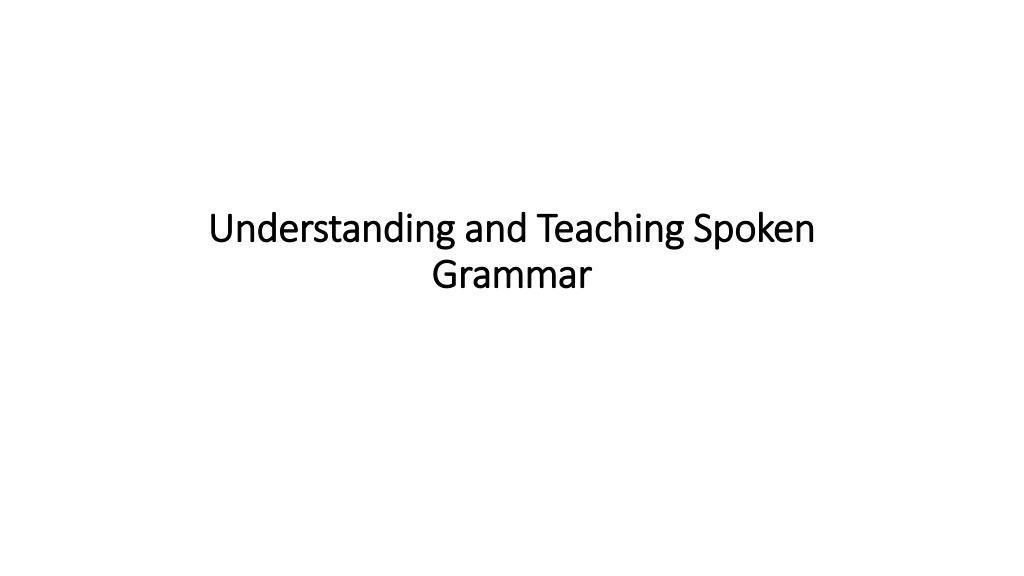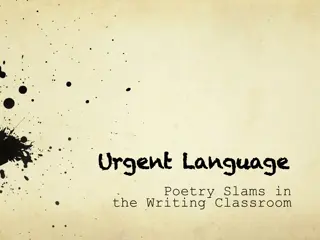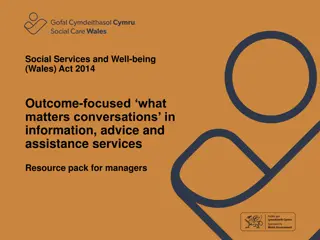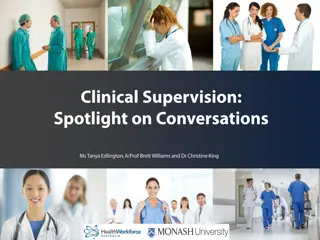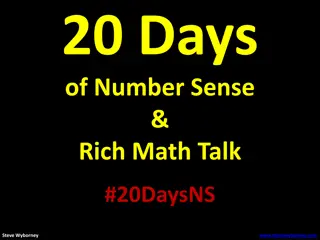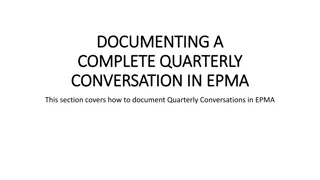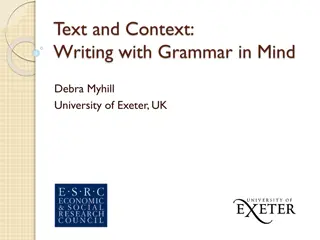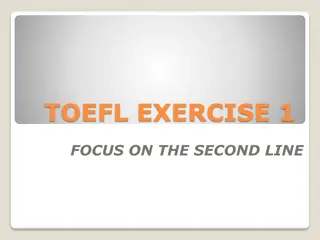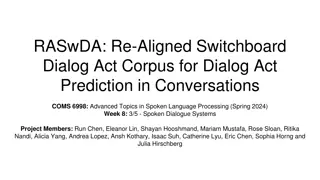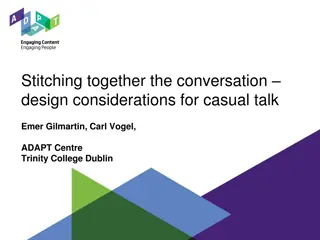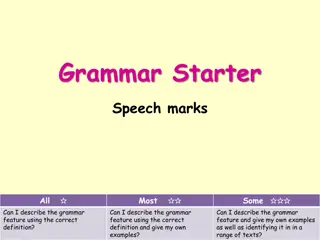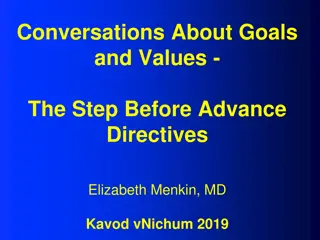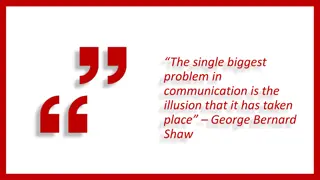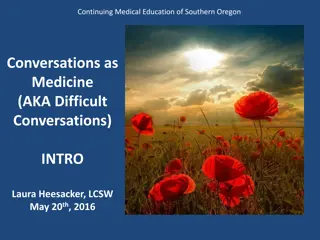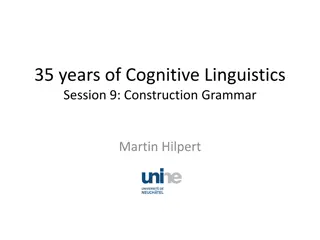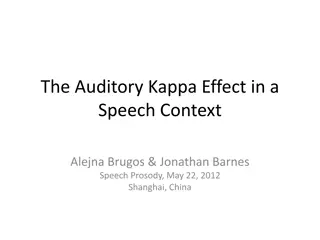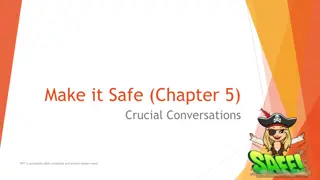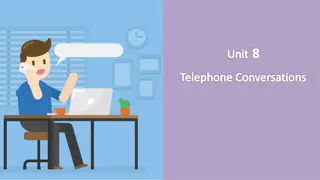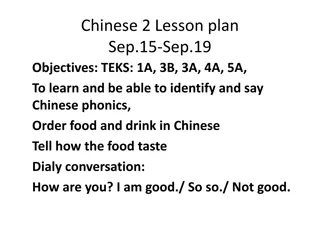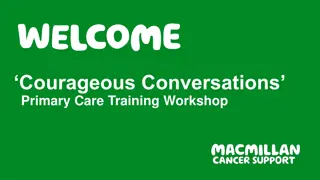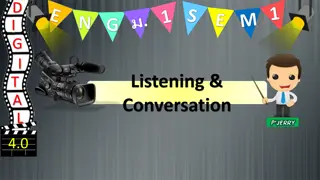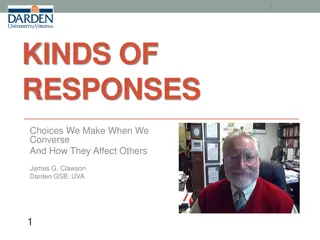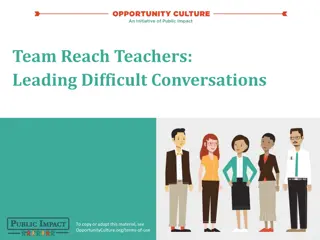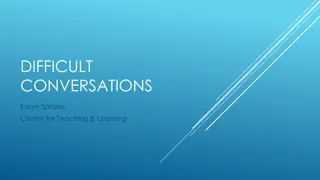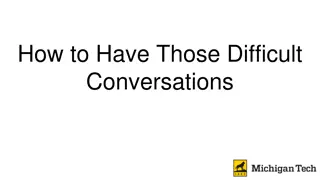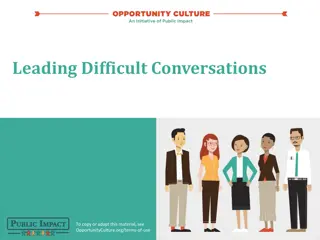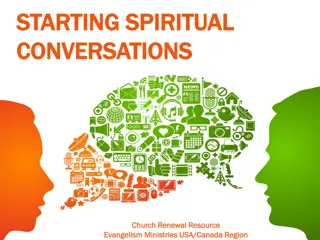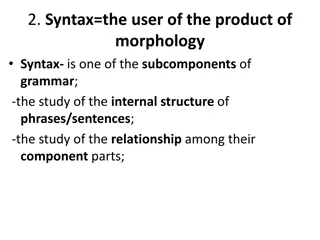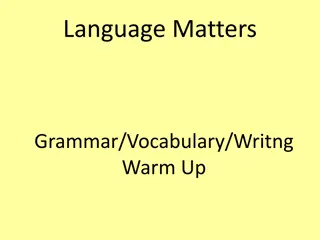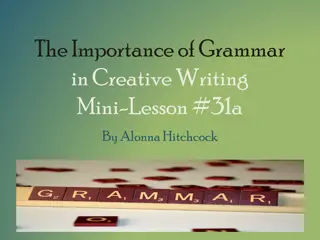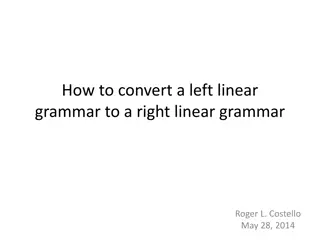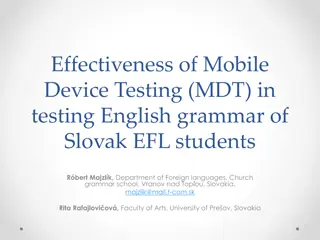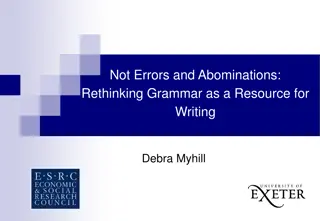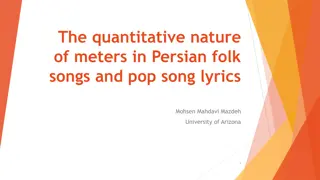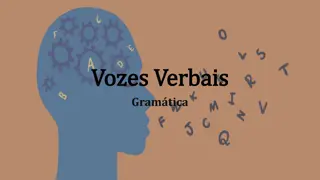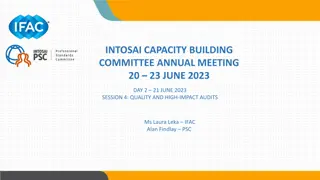Exploring Spoken Grammar: Understand, Teach, and Implement in Conversations
Delve into the nuances of spoken grammar in English language conversations, exploring its teachability, importance, and practical application. Discover key features, teaching methods, and scholarly insights from experts in the field. Uncover the relevance of frequently-used grammatico-lexical features and their role in effective communication.
Download Presentation

Please find below an Image/Link to download the presentation.
The content on the website is provided AS IS for your information and personal use only. It may not be sold, licensed, or shared on other websites without obtaining consent from the author. Download presentation by click this link. If you encounter any issues during the download, it is possible that the publisher has removed the file from their server.
E N D
Presentation Transcript
Understanding and Teaching Spoken Understanding and Teaching Spoken Grammar Grammar
A. What is spoken grammar? B. Is it teachable? C. Should we teach it? D. Which features of spoken grammar should we teach? E. How can we teach it? 2
Q? 1. It s a great place to visit, Barcelona. 2. That friend of yours, did you see her again? 3. Shall we go for a walk or something? 4. A: Beautiful day, isn t it? B: Lovely! 5. Then she said to me, hey, where are you going? 6. How was the meeting? Nice and quick, I hope. 7. Look, are you sure we re going the right way? 3
1. Its a great place to visit, Barcelona. 2. That friend of yours, did you see her again? 3. Shall we go for a walk or something? 4. A: /Beautiful day, isn t it? B: /Lovely! 5. Then she said to me, hey, where are you going? 6. How was the meeting? Nice and quick, I hope. 7. Look, are you sure we re going the right way? 4
Journal articles: McCarthy, M. and R. Carter.1995. Spoken Grammar: what is it and how can we teach it?, ELT Journal 49(3): 207-218. Carter, R. and M. McCarthy. 2004. Hyperbole in everyday conversation, Journal of Pragmatics 36: 149-184 Books: Channell, J. 1994. Vague Language. Oxford University Press. Carter, R. and M. J. McCarthy. 1997. Exploring Spoken English. Cambridge: Cambridge University Press. 5
Biber, D., S. Johansson, G. Leech, S. Conrad and E.Finegan. 1999. Longman Grammar of Spoken and Written English. Carter, R. and M. McCarthy. 2006. Cambridge Grammar of English. 6
Those paintings, are they by Picasso? Headers (Carter and McCarthy 2006) Noun phrase prefaces (Biber et al. 1999) Pre-posed element (Halliday 1985) 7
Spoken grammar: Frequently-used grammatico-lexical features of conversational English that have been noticed by teachers and described by corpus researchers, but haven t yet become part of our everyday teaching syllabuses . 8
A. What is spoken grammar? B. Is it teachable? C. Should we teach it? D. Which features of spoken grammar should we teach? E. How can we teach it? 9
1. Are there rules of grammar and usage that can be taught/discovered/learnt/acquired? 2. Are these rules generalisable (i.e. can students apply them to create new utterances)? 3. Are these rules fairly straightforward? 10
A: What a wonderful view! B: Fantastic! (pointing) That white building, is it the Museum of Contemporary Art? A: I think so. 11
Q? Is that white building the Museum of Contemporary Art? That white building, is it the Museum of Contemporary Art? 12
Is that white building the Museum of Contemporary Art? (9 words) That white building, is it the Museum of Contemporary Art? (10 words) [co-referential pronoun] 13
Q? That tall guy at the bar, do you recognise him? The woman that asked the question, did you get her name? Your parents, are they both coming tonight? My coat and scarf, I ve left them in the library! 14
That tall guy at the bar, do you recognise him? [prepositional phrase as head] The woman that asked the question, did you get her name? [relative clause as head] Your parents, are they both coming tonight? [subject] My coat and scarf, I ve left them in the library! [object] 15
Q? That white building, is it the Museum of Contemporary Art? That tall guy at the bar, do you recognise him? The woman that asked the question, did you get her name? Your parents, are they both coming tonight? My coat and scarf, I ve left them in the library! 16
1. Important things first 2. Often questions 3. Pointing your finger 4. Shared information 17
Q? A: There aren t any trains after nine. B: That s what I thought, but apparently there is one at eleven. C: They said it s going to rain. D: I know. That s why I brought my umbrella. E: It s sold out, but you can queue for tickets on the day. F: I know. That s how I got tickets last time. 18
A: There arent any trains after nine. B: That s what I thought, but apparently there is one at eleven. C: They said it s going to rain. D: I know. That s why I brought my umbrella. E: It s sold out, but you can queue for tickets on the day. F: I know. That s how I got tickets last time. 19
DEMONSTRATIVE WH-CLEFT typical pattern:that s + what/why/how/where/when + dependent clause: A: So you go to the market? B: Of course. That s where you get the cheapest vegetables. Less emphatic version: You get the cheapest vegetables there. 20
A. What is spoken grammar? B. Is it teachable? C. Should we teach it? Q? D. Which features of spoken grammar should we teach? E. How can we teach it? 21
1. She's probably gone for a walk or something. (She's probably gone for a walk or to see a friend or buy some milk.) 2. Have you seen the thing for cutting pizzas? 3. It s a sort of cake. 4. Any messages? OR Any luck? (Are there any messages? OR Did you have any luck?) 5. I said, look are you sure? (I asked her if she was really sure.) 22
A. What is spoken grammar? B. Is it teachable? C. Should we teach it? D. Which features of spoken grammar should we teach? E. How can we teach it? 23
1. It would be useful to students learning English. 2. It s teachable and likely to be learnt. And for some items: 3. It s useful but perhaps from a receptive, rather than a productive point of view. 24
Q? 1. In fact, that's why last year they rented a nice house, in er Spain, was it, is that it was near the airport. (Carter and McCarthy 2006: 171). 2. England are going to be useless in the World Cup, innit? 3. One of my friends at college, his uncle has an apartment near Barcelona. 25
Word order & ellipsis: Emphasis: Cleft structures & binomial phrases Heads & tails/Declarative questions/Ellipsis Hyperbole/Interjections/ Vague language: quantities/Vague lexical bundles Vague categories/Vague placeholders & Marking spoken discourse: Adverbials/Discourse markers/ Ways of using direct speech Response language: Synonymous/Cooperative language & dependent clauses Response tokens & questions/So & do 28
Word order & ellipsis: Heads & tails I thought it was great, that film. Declarative questions A: It took me hours to get to the restaurant. B: You got lost? A: Completely. Ellipsis A: [It s a] Lovely day, isn t it? B: [Yes, it s] Beautiful. A: [It s a] Shame we ve got to work. 29
Emphasis: Hyperbole I ve got a million emails to do. Interjections Oops! I ve said the said the wrong thing, haven t I? Cleft structures & binomial phrases A: So you go to the market? B: Of course. That s where you get the cheapest vegetables Gosh, it s lovely and warm in here. 30
Vague language: Vague categories A: What did you get up to on your holiday? Anything exciting? B: Not really. Just swam, walked, shopped and things. Vague placeholders & quantities A: Was the film any good? B: Yeah. Whatsername was in it. The actress who was in Fargo . I think we ve got a bit of a problem. Vague lexical bundles I don t know if you re doing the right thing. 31
Marking spoken discourse: Adverbials A: So you met at work, then? B: Yeah. She was actually my boss. Discourse markers It s quicker to go by bike, you know. Ways of using direct speech She insisted on paying for the meal, so I said okay as long as I get the next one. 32
Response language: Response tokens & questions A: So if there s anything you need, just call me. B: Brilliant. Perfect. I ll see you later. So & do A: Dave will bring everything we need. B: Sohe says. Let s hope so. Synonymous/Cooperative language & dependent clauses A: Everything went wrong. B: I know. It was a complete disaster. A: It ll be a great day. B: Unless it rains. 33
A. What is spoken grammar? B. Is it teachable? C. Should we teach it? D. Which features of spoken grammar should we teach? Q?E. How can we teach it? 34
Suggested method: 1. Guided discovery through two/three-line dialogues, or longer compromise dialogues. [ elicit further examples/formation/usage] 2. Controlled practice through reading aloud and exercises (gap-filling, transforming, matching, multiple choice etc.) 3. Freer practice through simulations 35
1. Guided discovery through two/three-line dialogues or longer, compromise dialogues. [ elicit further examples/formation/usage] Q? A: Look at those yachts. They re amazing. B: When I m rich and famous, I ll buy you one. C: Look at the weather outside. It s snowing now. D: I don t care. It s lovely and warm in here. E: How was the meeting? F: Nice and quick. G: I m sick and tired of tidying up your clothes. H: Why don t you just ignore them? 36
1. Guided discovery through two/three-line dialogues or longer, compromise dialogues. [ elicit further examples/formation/usage] A. rich and famous, weird and wonderful, sick and tired, loud and clear, safe and sound, bright and early Q? B. lovely and warm, nice and quick, good and strong etc. 37
1. Guided discovery through two/three-line dialogues or longer, compromise dialogues. [ elicit further examples/formation/usage/rules] lovely/nice + and + positive adjective: Lovely/nice and hot (e.g. soup, weather); lovely/nice and cosy (e.g. room, hotel); lovely/nice and friendly (e.g. person, place); niceand easy (e.g. a journey, an arrangement) good + and + positive adjective: I ll put the chicken in if the oven s good and hot./That rucksack of yours looks good and strong./The roads are good and flat, so you shouldn t have any trouble cycling. 38
1. Guided discovery through two/three-line dialogues or longer, compromise dialogues. [ elicit further examples/formation/usage/rules] Q? A: Thank goodness they've finally gone! It's two in the morning. B: What a mess! That red bag in the corner, is it yours? A: Oh no! Someone's left it. The girl with the tall boyfriend, do you know her name? I think it's her bag. They left at midnight. B: She ll ring us, won t she? Anyway, we'd better start clearing up. Those bottles on the table, are they all empty? A: Yes. They can be recycled. 39
2. Controlled practice through reading aloud and exercises (gap-filling, transforming, matching, multiple choice etc.) Fill the gaps with the most appropriate word: watery, thirtyish, plasticky, vinegary, browny, woody, shortish A: So what do you think of the place? B: It s OK. A bit __________ perhaps. I mean, look at these tables. [plasticky] C: But they re wood, aren t they? B: I don t think so. It s a __________ kind of feel, but not real wood. [woody] A: The chef s famous, anyway. C: Is he? Or she? A: He s on TV all the time. __________, I reckon, or younger. [thirtyish] Etc. 40
2. Controlled practice through reading aloud and exercises (gap-filling, transforming, matching, multiple choice etc.) A: That car s enormous. B: You re right. It s _______________. [huge/gigantic/really big] C: Jake says he ll do something and then he changes his mind. D. I know. (He s not /He isn t You can t ) _______________________. [You can t rely on him, can you?/He s not very reliable, is he?] E: The town centre s incredibly busytoday, isn t it? F: _______________ ! [Really crowded/Crazy/Packed solid!] Etc. 41
2. Controlled practice through reading aloud and exercises (gap-filling, transforming, matching, multiple choice etc.) A: It s freezing today, isn t it? [Freezing today ] B: Yeah. I wish summer would come. [Wish summer ] C: Why don t we finish these potatoes off? D: OK. It s a pity to waste them, I guess. [A pity/Pity to ] E: Karen s bought a ping-pong table for the back garden. F: That sounds fun. Have you had a go yet? [Sounds fun.] [You had a go yet?] 42
3. Freer practice through simulations With your partner, invent some questions or statements with heads or tails that you could use in these situations: 1. You re in a restaurant. (Ideas: where you re going to sit; what you see on the menu; what the food is like; the people you see.) e.g. That table by the bar, do you think it will be noisy? 2. You re in a clothes shop. (Ideas: the clothes that you can see; trying on a jacket or a pair of shoes; the prices; whether items of clothes would suit you.) e.g. They re very tight, these jeans. 43
3. Freer practice through simulations Invent a list of six things that you or your friends/family have recently done or are doing. Include some surprising things. Tell your partner, who should reply with a response question. Continue the conversation, then swap roles. A: I ve just bought a new computer game. B: Have you? What s it called? etc. A: My brother s learning Japanese. B: Is he? Why? etc. A: I quit my job yesterday. B: You did what? I thought you were enjoying it. etc. 44
3. Freer practice through simulations Get students into small groups. Tell them that they re visiting a large museum. They won t have time to see everything, so they have to decide where to go and why, using some of the discourse markers they ve learnt: I mean, you see, you know, right, well , listen, look, hey First floor: Gallery 1: Exhibition of 19th century Japanese painting Gallery 2: Artefacts of Ancient Egypt Second Floor: Gallery 3: Exhibition of Mediterranean Ceramics Gallery 4: Islamic Art and Science Etc. E.g.: A: Right. Where shall we start? B: Well, we can t see it all. I mean, we ve only got an hour. 45
